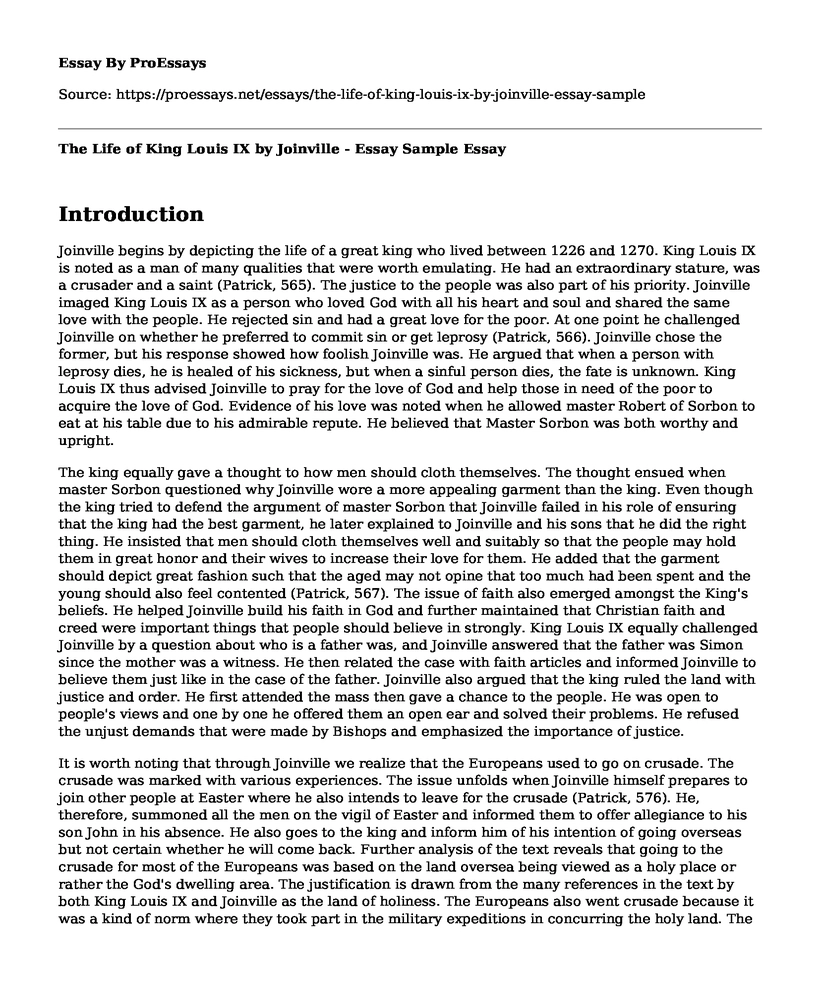Introduction
Joinville begins by depicting the life of a great king who lived between 1226 and 1270. King Louis IX is noted as a man of many qualities that were worth emulating. He had an extraordinary stature, was a crusader and a saint (Patrick, 565). The justice to the people was also part of his priority. Joinville imaged King Louis IX as a person who loved God with all his heart and soul and shared the same love with the people. He rejected sin and had a great love for the poor. At one point he challenged Joinville on whether he preferred to commit sin or get leprosy (Patrick, 566). Joinville chose the former, but his response showed how foolish Joinville was. He argued that when a person with leprosy dies, he is healed of his sickness, but when a sinful person dies, the fate is unknown. King Louis IX thus advised Joinville to pray for the love of God and help those in need of the poor to acquire the love of God. Evidence of his love was noted when he allowed master Robert of Sorbon to eat at his table due to his admirable repute. He believed that Master Sorbon was both worthy and upright.
The king equally gave a thought to how men should cloth themselves. The thought ensued when master Sorbon questioned why Joinville wore a more appealing garment than the king. Even though the king tried to defend the argument of master Sorbon that Joinville failed in his role of ensuring that the king had the best garment, he later explained to Joinville and his sons that he did the right thing. He insisted that men should cloth themselves well and suitably so that the people may hold them in great honor and their wives to increase their love for them. He added that the garment should depict great fashion such that the aged may not opine that too much had been spent and the young should also feel contented (Patrick, 567). The issue of faith also emerged amongst the King's beliefs. He helped Joinville build his faith in God and further maintained that Christian faith and creed were important things that people should believe in strongly. King Louis IX equally challenged Joinville by a question about who is a father was, and Joinville answered that the father was Simon since the mother was a witness. He then related the case with faith articles and informed Joinville to believe them just like in the case of the father. Joinville also argued that the king ruled the land with justice and order. He first attended the mass then gave a chance to the people. He was open to people's views and one by one he offered them an open ear and solved their problems. He refused the unjust demands that were made by Bishops and emphasized the importance of justice.
It is worth noting that through Joinville we realize that the Europeans used to go on crusade. The crusade was marked with various experiences. The issue unfolds when Joinville himself prepares to join other people at Easter where he also intends to leave for the crusade (Patrick, 576). He, therefore, summoned all the men on the vigil of Easter and informed them to offer allegiance to his son John in his absence. He also goes to the king and inform him of his intention of going overseas but not certain whether he will come back. Further analysis of the text reveals that going to the crusade for most of the Europeans was based on the land oversea being viewed as a holy place or rather the God's dwelling area. The justification is drawn from the many references in the text by both King Louis IX and Joinville as the land of holiness. The Europeans also went crusade because it was a kind of norm where they took part in the military expeditions in concurring the holy land. The holy land is mentioned severally in the case of Joinville, and it was because of the experiences that accompanied the crusade which made him inform King Louis IX of not being sure about his return. Therefore, the European's experiences on the crusade were marked with holy battles in capturing the holy land. It was a requirement that at some point the King and other leaders had to visit the land for the holy wars. The events that accompanied the holy battles were be opined as part of God's holy work.
Conclusion
In summary, the text majorly recounts he life of King Louis. Joinville could dictate the life of the holy king based on his closest service for six years as a company on the pilgrimage overseas. Therefore, most of the things imaged were those that he saw and heard. The summary was mainly composed of the life of King Louis as a man who loved God and his people. The text also enables us to realize why the Europeans went on crusade together with the experiences that were encountered as noted therein.
Works Cited
Patrick, Geary. The Life of King Louis by Joinville. Reading in Medieval History. Fifth Edition. The University of Toronto. 1979.
Cite this page
The Life of King Louis IX by Joinville - Essay Sample. (2022, May 16). Retrieved from https://proessays.net/essays/the-life-of-king-louis-ix-by-joinville-essay-sample
If you are the original author of this essay and no longer wish to have it published on the ProEssays website, please click below to request its removal:
- A Review of Who Freed The Slaves? The Fight Over the Thirteenth Amendment
- Contradictions of the 1920s: Roaring Twenties Essay
- Roles of America in Cold War Asia Essay
- The Case on Rosenbergs Essay Example
- Essay Example on Thucydides: Realist Interpretations of 'The Peloponnesian War' Relevant Today
- Essay Sample on Combat: A Weapon of War and Terror
- Essay Example on 1960s London Working-Class Skinheads: Subculture & Racism







